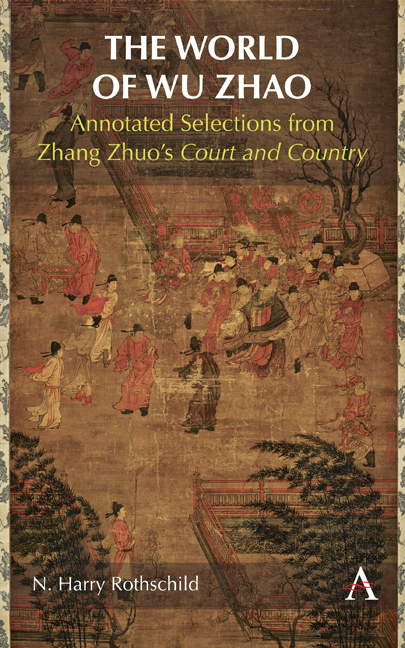Book contents
- Frontmatter
- Dedication
- Contents
- Acknowledgments
- Figures
- Map
- Tables
- Weights and Measures
- Introduction
- Chapter 1 Wu Zhao: her inner palace, her inner circle
- Chapter 2 The culture of the court
- Chapter 3 “Cruel officials”: Wu Zhao’s “teeth and horns”
- Chapter 4 Beyond court and capital: local officials
- Chapter 5 The common people
- Chapter 6 Relationships: men, women, and family in the time of Wu Zhao
- Chapter 7 Generals and military men
- Chapter 8 The frontier and beyond: foreigners and others during Wu Zhao’s reign
- Chapter 9 Religion and the supernatural world
- Chapter 10 Flora, fauna, and the natural world
- Afternote
- Appendix: People and Places
- Notes
- Bibliography
- Index
Chapter 9 - Religion and the supernatural world
Published online by Cambridge University Press: 15 November 2023
- Frontmatter
- Dedication
- Contents
- Acknowledgments
- Figures
- Map
- Tables
- Weights and Measures
- Introduction
- Chapter 1 Wu Zhao: her inner palace, her inner circle
- Chapter 2 The culture of the court
- Chapter 3 “Cruel officials”: Wu Zhao’s “teeth and horns”
- Chapter 4 Beyond court and capital: local officials
- Chapter 5 The common people
- Chapter 6 Relationships: men, women, and family in the time of Wu Zhao
- Chapter 7 Generals and military men
- Chapter 8 The frontier and beyond: foreigners and others during Wu Zhao’s reign
- Chapter 9 Religion and the supernatural world
- Chapter 10 Flora, fauna, and the natural world
- Afternote
- Appendix: People and Places
- Notes
- Bibliography
- Index
Summary
HOWARD WECHSLER HAS REMARKED THAT, by the early Tang, rulers “drew upon the newer legitimating values of Buddhism and Taoism in order to expand the conventional body of philosophico-religious legitimation that had previously been centered on Confucianism.” David McMullen seconds this sense of the Tang as a cosmopolitan, multidenominational era, remarking that “the transcendental faiths of Buddhism and Daoism also exerted claims on the emperor’s commitment, time and resources.” On elite and popular levels, numerous cults developed around eminent Buddhist and Daoist figures in the pluralistic and multiethnic realm of seventh-century China.
Though Buddhism, Daoism, and Confucianism were collectively known as the “three teachings” (sanjiao 三教) in the Tang, an ideological rivalry existed between them. In the period—excepting clergy, monks, and adepts—a person did not identify as a Daoist, a Buddhist, or a Confucian the same way someone in contemporary times might consider themselves a Democrat or a Republican. On a folk level, these “three teachings” were intermingled and jumbled; on an elite, textual and scriptural level, they were differentiated. Even literati and ministers might be “workday Confucians and weekend Daoists,” escaping from the structured rigidity and tribulations of official life by wandering the hills, drinking wine on an open pavilion, writing free-flowing calligraphy, waxing poetic in inebriated company, or practicing Daoist breathing techniques to relax and prolong life. These same individuals might retreat to a Buddhist temple for prayer or hold a Buddhist mass for a deceased parent. Nonetheless, when wielding their calligraphy brushes in discursive combat, Confucian court officials—Zhang Zhuo was no exception—sometimes cast Daoists as charlatans and frequently skewered Buddhism as a wasteful and extravagant foreign religion. On the whole, Zhang Zhuo’s attitude toward Daoism is much more open-minded and less skeptical than his biased perspective toward Buddhism.
A number of anecdotes in Court and Country reveal that Zhang Zhuo was not a stone-cold Confucian rationalist, impervious to folk superstitions and popular beliefs. Many accounts—not necessarily skeptical or dubious in tone—provide interesting insights into the practices of diviners, shamans, achillomancers, and interpreters of dreams. Other stories and snippets offer curious and distinctive glances into beliefs about the supernatural.
- Type
- Chapter
- Information
- The World of Wu ZhaoAnnotated Selections from Zhang Zhuo's <i>Court and Country</i>, pp. 171 - 196Publisher: Anthem PressPrint publication year: 2023



